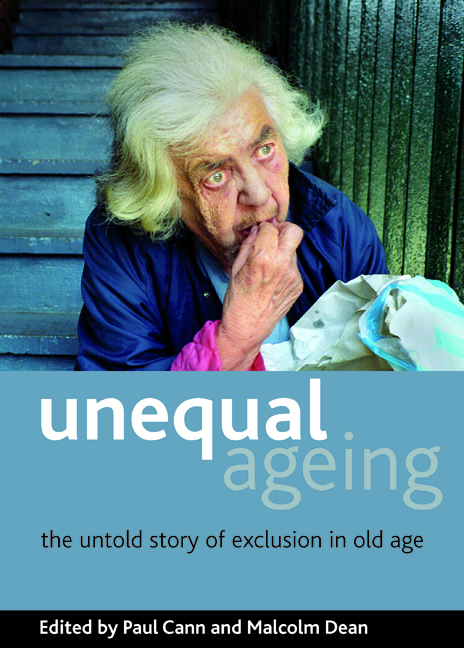Book contents
- Frontmatter
- Contents
- List of tables and figures
- Notes on contributors
- Acknowledgements
- one How social age trumped social class?
- two Too tight to mention: unequal income in older age
- three three The uneven dividend: health and well-being in later life
- four No place like home? Housing inequality in later life
- five What does it mean to be old?
- six A life worth living? Quality of life in older age
- seven Why is ageing so unequal?
- eight Rewriting the story
- Index
four - No place like home? Housing inequality in later life
Published online by Cambridge University Press: 16 July 2022
- Frontmatter
- Contents
- List of tables and figures
- Notes on contributors
- Acknowledgements
- one How social age trumped social class?
- two Too tight to mention: unequal income in older age
- three three The uneven dividend: health and well-being in later life
- four No place like home? Housing inequality in later life
- five What does it mean to be old?
- six A life worth living? Quality of life in older age
- seven Why is ageing so unequal?
- eight Rewriting the story
- Index
Summary
• Average male life expectancy at birth in the Lenzie district of Glasgow is 82; in the Calton district of the same city it is 54.
• Of the two million homes in England in serious disrepair, 38 per cent are occupied by older people.
• The number of disabled people in England is set to double by 2041; poorer older people are more likely to need adaptations to their homes to live independently.
• In remote rural areas 29 per cent of households in poverty contain someone over 60.
The importance of home
The quality of a home shapes quality of life. The physical condition of a person's home and the qualities of the neighbourhood in which they live influence their health and ability to be involved with their family, friends and social networks. Housing suitability and standards play a key role in determining emotional well-being, including an individual's sense of engagement with, or exclusion from, wider society. Home is inextricably linked to personal identity, social status and sense of having control over one's life. Quality and suitability of place are key determinants of the experience of growing older, hence the centrality of housing and neighbourhood in the debate about age and inequality.
Throughout this book we explore how ageing can decline into a journey of loss, of different kinds, rather than one of gain and progressive fulfilment. This is certainly true in housing. Several studies highlight the fear of loss of control over where and how one lives in older age.
The majority of older people say they want to remremain in their own homes for as long as possible. This has become a cornerstone of policies relating to older people's housing, health and social care. Enabling independent living and providing care at or closer to home are key objectives. So the quality and suitability of the homes of older people, and consequently the impact of inequality in housing, is key to this wider policy objective.
This chapter explores:
• the housing inequalities experienced by older people generally compared with other age groups
• the housing inequalities between different sectors of the older Population
• emerging and necessary policy responses.
- Type
- Chapter
- Information
- Unequal AgeingThe Untold Story of Exclusion in Old Age, pp. 77 - 100Publisher: Bristol University PressPrint publication year: 2009



